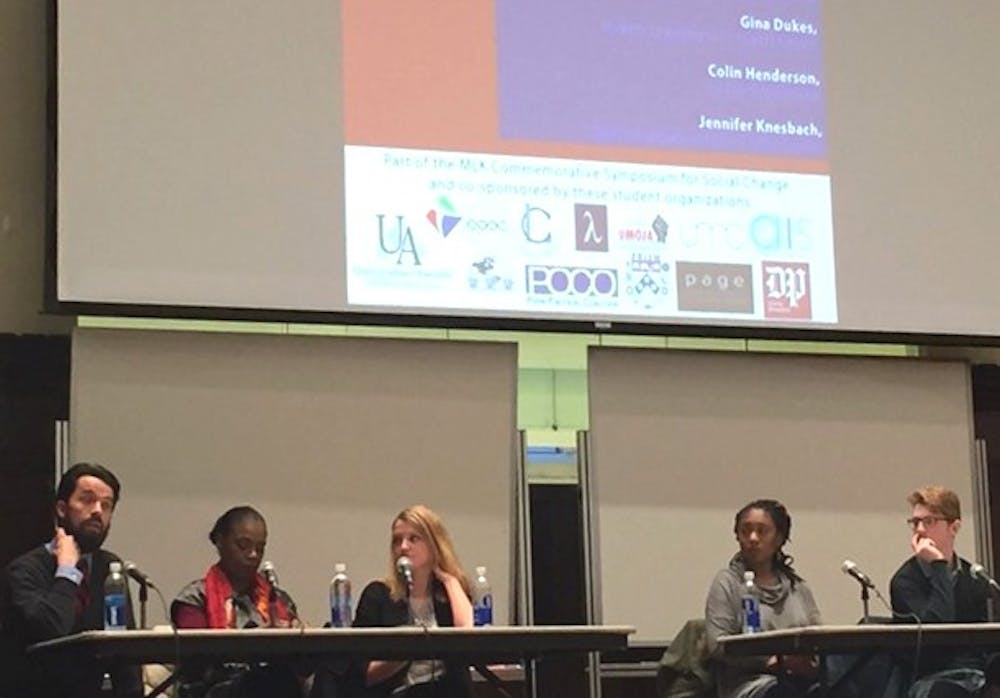
The Open Expression Panel discussed the ideas of safe spaces and microagressions.
Credit: Lauren FeinerThe terms “safe space” and “trigger warning” are familiar to college students across the nation. In light of recent events on college campuses like the University of Missouri and Yale University, several student groups at Penn organized an open panel to discuss the different — and often conflicting — aspects of open expression.
The event, titled “Laws Without Morals Are Vain: Open Expression,” references Penn’s motto and questions the validity of free speech inside and outside the classroom. As part of the Dr. Martin Luther King, Jr., Commemorative Symposium on Social Change, the event recognized Penn’s commitment to being an environment conducive to open discourse and debate. Panelists at the event also discussed whether steps need to be taken to ensure that minority voices and interests are also heard and protected.
Panelists included University of Pennsylvania Law School professors Anita Allen — who is also the vice provost for faculty — and Stephanos Bibas. Students on the panel included College senior Gina Dukes, co-founder of Students Organizing for Unity and Liberation; Wharton junior Colin Henderson, president of The Daily Pennsylvanian; and College and Wharton junior Jennifer Knesbach, president of the Penn College Republicans and co-chair of the Penn Political Coalition.
“‘Safe space’ is an elastic term that means different things to different people,” Bibas said. “The movement toward microaggressions and safe spaces is concerning to me. It’s an impulse to protect people from hurtful speech but instead it hyper-sensitizes them [...] We should be censuring, not censoring.”
Bibas condemned a case in which students concerned about causing distress to rape victims asked their Harvard law professors to not teach rape law and to refrain from using the word “violate,” in the context of “that violates the law.”
College senior and co-founder of SOUL Gina Dukes, however, argued that freedom of expression can sometimes lead to hateful speech and actions.
She spoke about the 2014 Phi Delta Theta Christmas card controversy at Penn, in which the fraternity brothers posed with a dark-skinned blow-up doll.
“The picture felt like a threat to my identity as a black woman on campus,” Dukes said, citing the University’s Open Expression Guidelines, which specifies that conduct that causes injury to persons or property or threatens to cause such injury is impermissible. “As faculty and students, we should not tolerate this. Once that [free] speech turns into hate, actions need to be taken to make sure that it isn’t allowed on campus.”
Professor Allen supported Dukes’ view by challenging the traditional notion that a great university is one where unfettered speech prevails. Rather, it should be one where intellectuals flourish and reason dominates.
Allen shared her experiences growing up in an era of institutionalized racism and said that even though she has been able to grow with society, she still has “a lot of scars and baggage.”
“It’s still the case that freedom of speech means that you have to hear a lot of things you don’t want to,” Allen said. “But we can’t make it illegal to say things that are hurtful.”
Instead, Allen proposed sanctions that are educational rather than punitive and supports Penn’s initiatives to address the issue through the “Campaign for Community” and discussion panels. She mentioned the recent proposal of a board that deals with cultural sensitivity in Greek life, but said this may not be exactly the answer.
Apart from addressing open expression and its relation to racial, ethnic and other demographic minorities, panelists also talked about being minorities in thought.
College and Wharton junior Jennifer Knesbach shared her experiences serving as the president of the Penn College Republicans.
“There are a lot of conservative students on campus but a lot of students don’t openly identify as Republican,” Knesbach said. She explained that although many students had privately told her that they were Republican, they denied the College Republicans shirts she offered them.
“This says a lot about [the culture of] higher education in America,” she said.
Despite the difficulty in establishing an objective criterion of open expression, Henderson applauded the coming together of “members in groups seemingly as disparate as SOUL and College Republicans” to discuss the issue. “That’s the amazing thing about Penn,” he said.
The Daily Pennsylvanian is an independent, student-run newspaper. Please consider making a donation to support the coverage that shapes the University. Your generosity ensures a future of strong journalism at Penn.
DonatePlease note All comments are eligible for publication in The Daily Pennsylvanian.







